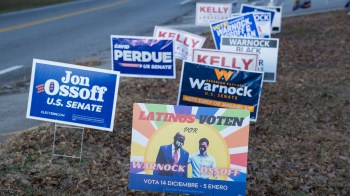In one Virginia county, two very different tales
Jeff Horwich: The presidential election is exactly eight weeks away. As part of our coverage of what matters to voters — what we call “The Real Economy” — we’ve got the first in a series of stories from Loudoun County, Va. Virginia is a swing state that could help decide the presidential race. And Loudoun County is seen as one of the hinges Virginia could turn on.
Here’s Marketplace’s Nancy Marshall-Genzer.
Nancy Marshall-Genzer: On Capitol Hill, Democrats and Republicans sit on either side of the aisle. Here in Loudoun County, 35 miles from the Capitol, the dividing line is Route 15, separating east from west. I’m lurching along 15 with Liz Whiting, a local lawyer and historian who’s giving me a tour of the east.
Liz Whiting: There’s always been an east/west split. The question is what are the issues.
Slavery was the issue during the Civil War. People in the east owned slaves. Folks in western Loudoun did not. Today, people clash over growth. Loudoun’s population surged 84 percent from 2000 to 2010. Owners of horse farms in western Loudoun go fox hunting and buy up land for preservation. Most of the growth is in the east. It’s spawned traffic jams and, Whiting says, resentment.
Whiting: Are we the east required to absorb the growth because you still want the pastures for your horses?
The newcomers in the east are more middle and working class. They’ve turned this once reliably Republican county into a tossup.
Thirty-three-year-old Megan Tolosa voted for President Obama in 2008. Since then she and her husband, Michael, have struggled with unemployment and an underwater mortgage. And Tolosa has been re-evaluating the president.
Megan Tolosa: He just seems so tired and he doesn’t seem his happy self anymore. He just seems kind of defensive a lot and I just feel like he’s not a strong leader.
But Tolosa doesn’t like Gov. Romney much, either. She says he doesn’t care enough about the poor. Still, drive out to western Loudoun County and Romney signs start to sprout along the country roads. I meet another local historian, Eugene Scheel, at a family restaurant in the village of Purcelville.
Eugene Scheel: This is not food that your doctor ordered.
Over lunch, Scheel tells me that a few years ago, activists in the west tried to secede from Loudoun and form their own county — free of the changing demographics of the east. But they couldn’t get approval from the state legislature. Scheel says the east and west remain two different worlds.
Scheel: I think these worlds will remain the same. I don’t think they’re going to get together.
They will vote together on November 6th. How it’ll turn out here is anybody’s guess. I did see those Romney signs in western Loudoun, but just as many Obama bumper stickers in the traffic-choked east.
In Loudoun County, Va., I’m Nancy Marshall-Genzer for Marketplace.
There’s a lot happening in the world. Through it all, Marketplace is here for you.
You rely on Marketplace to break down the world’s events and tell you how it affects you in a fact-based, approachable way. We rely on your financial support to keep making that possible.
Your donation today powers the independent journalism that you rely on. For just $5/month, you can help sustain Marketplace so we can keep reporting on the things that matter to you.


















